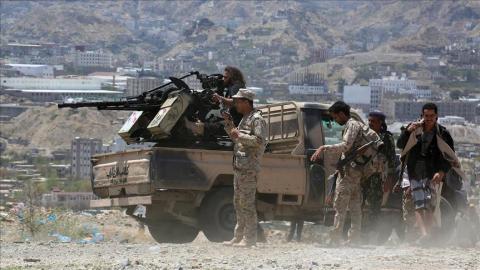'Time is running out' in Yemen: NGOs urge USAID to restore funding to Houthi-held north


Six of the largest humanitarian responders in Yemen urged USAID acting administrator John Barsa to immediately restore aid to Houthi-held northern Yemen.
The US government’s aid cuts in northern Yemen are “increasingly out of step” with realities on the ground and civilians are paying the price, six international relief organizations told John Barsa, acting administrator for the US Agency for International Development (USAID), in a letter obtained by Al-Monitor.
"Time is running out for tens of millions of Yemenis," wrote the executives at the International Rescue Committee, Norwegian Refugee Council (NRC), Oxfam America, CARE, Save the Children USA and Mercy Corps. "Humanitarians have stayed and delivered in Yemen in the midst of complex crises. But our ability to do so now is jeopardized unless the U.S. changes course."
Nearing its sixth year, the war in Yemen has created what the United Nations describes as the world’s worst humanitarian crisis. Hunger stalks the region’s poorest country, with half of all children under the age of five expected to be malnourished by the end of the year.
Diseases like cholera, diphtheria and now the coronavirus run rampant, and the recent deadly flooding has added to Yemen’s woes. Roughly 80% of the population relies on some form of humanitarian aid to survive, and yet the United Nations has received only 21% of its $2.4 billion humanitarian appeal this year for Yemen.
“The humanitarian response is critically underfunded despite being the largest humanitarian response in the world,” Sultana Begum, NRC advocacy manager for Yemen, told Al-Monitor.
The United States remains one of the largest humanitarian donors to Yemen but has cut its contribution significantly in 2020. The Donald Trump administration accuses the Iran-aligned Houthis, who are fighting the Western-backed, Saudi-led military coalition, of interfering with food distribution and diverting supplies away from those who need it.
After slashing $73 million in assistance for that reason in March, the administration announced in May it would provide $225 million in emergency aid for Yemen. US officials said they suspended funds to programs that “would not be implemented as they were designed due to the Houthi interference.”
Humanitarian carve-outs for “critical life-saving NGO activity” in Houthi areas were included, but the relief groups describe them as “too narrow to deliver an effective response.”
Programs to treat severe acute malnutrition were included in the carve-outs, for example, but funding is suspended for health workers who identify at-risk children and pregnant women, the aid organizations wrote. Hygiene, sanitation and clean water programming are similarly excluded at a time when the coronavirus is spreading unchecked throughout the country.
“Without a lifting of the suspension, some NGOs in Yemen will be forced to close life-saving programs and field offices or even end their presence in the north,” the relief groups wrote, describing the cuts as “increasingly out of step with the humanitarian situation and the realities of our operations on the ground.”
The aid organizations acknowledge the ongoing risk of aid diversion in northern Yemen, but say there has been a significant improvement. The Houthis, for example, have dropped their demand for a 2% tax on humanitarian activities and have cooperated with independent assessments of needs and monitoring missions.
“The US government is the only country trying to apply pressure through withholding aid,” Begum said. “You’ve got six of the largest aid agencies operating in Yemen saying to the US, your approach isn’t right.”
Speaking before the Security Council on Tuesday, UN Assistant Secretary-General for Humanitarian Affairs Ramesh Rajasingham called on countries, especially Yemen’s Gulf neighbors, to fulfill the pledges they made at an international donor conference in June.
Without urging funding, Rajasingham said the UN will scale back water and sanitation programs in 15 cities in the coming weeks, and halt its support to nearly 400 additional health facilities next month.

Yemeni officials on Monday condemned arrests and prosecutions by the Iran-backed Houthi militia directed against media, journalists and celebrities…

Yemen's warring parties are gearing up for new waves of conflict in 2023 amid a lack of decisive steps towards sustainable peace, adding to the suf…

The UAE will help to recruit doctors and deliver crucial supplies for hospitals in Yemen under a major healthcare drive. The Khalifa bin…